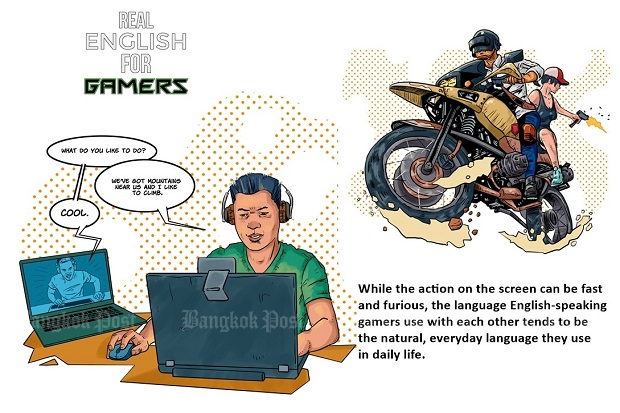Introducing Real English for Gamers
published : 11 Jan 2019 at 13:18
writer: Terry Fredrickson

The most popular video games can be great English-language-learning resources
Links: Youtube Channel
A common perception of video gaming among non-gamers is that at best it is a harmless distraction and at its worst, it’s an addictive time-wasting impediment to getting ahead in life.
While there certainly are dangers in excessive gaming– or anything else, for that matter – few people seem to realise the potential video games have for good, especially for English language learning.
The most popular games nowadays are multi-player games where effective communication is a must for winning. Games like Fortnite, League of Legends, Call of Duty and Player Unknown’s Battlegrounds (PUBG) are easy to join and geographical location is not a limitation. My son, for example, plays with gamers from around the world.
While a basic knowledge of English is generally needed to join in a game with international players, the language barrier is surprisingly low. Knowledge of the game itself is the key and proficient players can follow along even if they don’t understand much of what is being said.
If you get a friendly teammate you can learn a lot of English in a hurry.
Real English for Gamers will help prepare such players to enter their favorite games, but the serious learning starts when the game begins. Players are now in the real world of English, the language they will hear and use outside the classroom.
Real, but limited
The language may be real, but it is also limited. Much of the focus, of course, is on the game itself. Players talk about what is happening now, what just happened and what to do next. Asking and answering questions is a big part of it and, depending on the game, players may need to shout out enemy locations or cooperate in completing a task.
Learning the basics: Asking and answering questions
Video games are fun, so there is a lot of friendly banter between teammates and this takes some time to learn – and, in some cases, to avoid. The “F word” and other foul expressions are common, but there is no reason to repeat them. They do not make the speaker sound impressive.
Games are social and your new teammates may be curious about you, where you’re from, what your town and country are like, what you like to do, etc., etc.
So be prepared for “small talk,” ordinary conversation, Real English for Gamers will help with that.
The biggest challenge

Graphics by Denis Samovol
The biggest challenge may not be the words and phrases the players will hear, but the speed at which they are spoken. There is no classroom speed limit here. Nor is there a standard pronunciation system. You will hear all accents – native accents like American, British, Australian as well as non-native speakers struggling to be understood – just like in the lobby of a hotel with an international clientele.
Real English for Gamers will help your listening comprehension by giving you access to hundreds of in-game video clips in which you can hear and see what is being said, complete with vocabulary explanations. You will also learn techniques for coping with the speed of the language.
Yes, gaming can be a distraction, addiction is a danger, but let’s not dismiss what hundreds of millions of young people enjoy as a complete waste of time. Keep on gaming, but try it in English (or Thai, or French, or Korean) once in a while.
Learn from listening
Vocabulary
- accent: a way of saying words that shows what country, region, or social class someone comes from - สำเนียง
- addictive (adj): of something, e.g., especially a drug, a game, an activity like gambling, which you cannot stop once you have started - ซึ่งทำให้ติดได้; ซึ่งทำให้ติดยาได้
- banter: friendly conversation in which people tell jokes and laugh at each other - การล้อ,การล้อเล่น,การหยอกเย้า
- challenge: something that needs a lot of skill, energy, and determination to deal with or achieve - สิ่งที่ท้าทาย, การท้าทาย
- clientele (noun): customers - ลูกค้าทั้งหมด, ลูกค้าทั้งหลาย
- cooperate: to work with other people to achieve a result that is good for everyone involved - ร่วมมือกัน
- cope: to deal successfully with a difficult situation - รับมือกับ
- distraction: something that gets your attention and prevents you from concentrating on something else - การทำให้ไขว้เขว เสียสมาธิ
- effective: producing the result that was intended - ได้ผลดี
- enemy: a person who hates somebody or who acts or speaks against somebody/something - ศัตรู
- excessive: much greater than is usual; too much of something - มากเกินปริมาณที่พอดี
- explanation (noun): a description of how something happened or happens; giving the reasons why it happened - การอธิบาย, การชี้แจง, การขยายความ, คำอธิบาย
- foul: extremely unpleasant - น่ารังเกียจ
- impediment: barrier; something that stops people from going into a place - สิ่งกีดขวางทางผ่าน
- impressive: something that people admire because it is very good, very large or shows great skill - ซึ่งน่าประทับใจ
- language barrier: when two people speak different languages making it difficult to talk and communicate -
- limitation: a disadvantage or weak point that makes someone or something less effective - ข้อจำกัด
- limited: not much or enough; not very great in amount or extent - จำกัด
- native language: a person’s first language, learned as a child -
- perception: a particular way of understanding or thinking about something - ความเข้าใจ
- potential: qualities that exist and can be developed - ศักยภาพที่จะพัฒนาได้
- proficient: skilled and experienced - เจนจัด, ชำนาญ, เชี่ยวชาญ
- pronunciation: making the sounds of a language -
- waste of time: some activity that is not worth the time used to do it - การเสียเวลา
- Keywords
- video games
- games
- classroom speed limit
